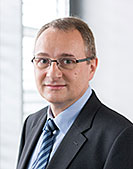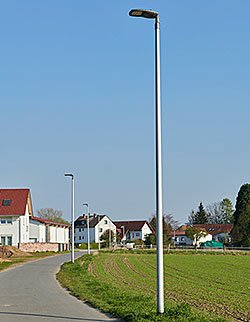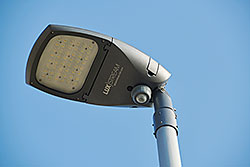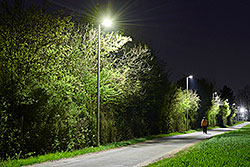Smart City technology from Tridonic for greater safety and environmental protection
Smart lighting for Darmstadt
As part of the “Digital City Darmstadt” project, a street section in the Wixhausen area of Darmstadt has been equipped with adaptive lighting. Integrated PIR sensors react to movement and ambient light and control the street lamps as required. This not only makes for greater safety and saves energy but also protects the environment from light pollution. Wireless modules are used to connect the street lamps to one another and to the Internet of Things (IoT). The project is Tridonic’s first installation of innovative Smart City technology with light-on-demand functionality.
In the Smart Lighting project in Darmstadt, intelligent street lamps have been installed to illuminate a road and footpath. The pilot installation consists of 13 LED street lamps with integrated sensors.
PIR sensors integrated in the street lamps react to movement and ambient light and control the street lamps as required. This gives a sense of security and saves energy.
Wireless modules connect the street lamps with each another and forward the signals. Data security is ensured by encrypted data transfer. Operators can access the system at any time via the Smart City platform and its management portal.
“Close cross-discipline collaboration is particularly important for the successful implementation of smart city projects. Disciplines that were previously separate now merge into a common solution in smart city applications”, said Waldemar Becker, Product Manager Smart City Applications at Tridonic. In the case of the smart lighting project in Darmstadt, all the various parties are working together in a team – including the project team from the Darmstadt city authority, planners, network providers, luminaire manufacturers and component suppliers. “Interdisciplinary collaboration right from the start was crucial for the success of the project, as was the willingness of the project team from the Darmstadt city authority to welcome suggestions and ideas from all the parties involved. As a result, and with the aid of Luxstream, we were able to complete the pilot project quickly and smoothly,” added Waldemar Becker.
A safe and eco-friendly digital future
Wireless modules connect the lights to each another and forward signals so that the entire street run is illuminated. Residents and the environment both benefit from the adaptive lighting. It provides pedestrians with high levels of safety and security. The light reacts to them, giving them an instant personal sense of security. Light pollution is significantly reduced thanks to dimming and the response to minimal changes in daylight – a major benefit for the environment, wildlife and flora, which would otherwise be disturbed by artificial light.
Smart street lighting also ensures high energy efficiency. “Energy consumption can be reduced simply by using LEDs rather than conventional light sources. But further savings of 50 percent can be achieved by the motion sensors, giving total savings of 87 percent”, said Waldemar Becker. The smart street lighting is currently in the testing phase. There are long-term plans to extend it to other places in and around Darmstadt.
Light on demand with Smart City technology
The pyroelectric (PIR) sensors developed by Tridonic detect differences in temperature and react to thermal radiation from road users by increasing the lighting level – without generating any personal data, of course. Data security is ensured by encrypted data transfer – from the wireless communication module to the server. The LED luminaires and sensors are integrated in a secure network. Operators can access the system at any time via the Smart City platform and its management portal, for example to change the grouping of the luminaires or the illuminance level. The platform also provides important information about the luminaires, such as their energy consumption, possible faults and pending maintenance work.
The PIR sensors are specially designed for detection in street environments where dimming is possible and sensible. They cover an area of up to 560 square metres at a mounting height of up to eight metres. Robust design and adequate protection against harsh external conditions make the sensors extremely durable.
Press contact:

Tridonic GmbH & Co KG
Färbergasse 15
6851 Dornbirn, Austria
Tel. +43 5572 395-45236
Mobile +43 664 80892 6313




